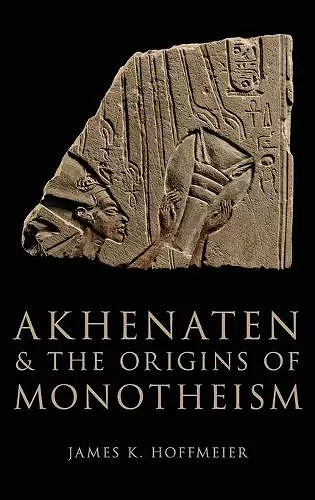Akhenaten and the Origins of Monotheism
Format:Hardback
Publisher:Oxford University Press Inc
Published:12th Mar '15
Currently unavailable, and unfortunately no date known when it will be back

Pharaoh Akhenaten, who reigned for seventeen years in the fourteenth century B.C.E, is one of the most intriguing rulers of ancient Egypt. His odd appearance and his preoccupation with worshiping the sun disc Aten have stimulated academic discussion and controversy for more than a century. Despite the numerous books and articles about this enigmatic figure, many questions about Akhenaten and the Atenism religion remain unanswered. In Akhenaten and the Origins of Monotheism, James K. Hoffmeier argues that Akhenaten was not, as is often said, a radical advocating a new religion but rather a primitivist: that is, one who reaches back to a golden age and emulates it. Akhenaten's inspiration was the Old Kingdom (2650-2400 B.C.E.), when the sun-god Re/Atum ruled as the unrivaled head of the Egyptian pantheon. Hoffmeier finds that Akhenaten was a genuine convert to the worship of Aten, the sole creator God, based on the Pharoah's own testimony of a theophany, a divine encounter that launched his monotheistic religious odyssey. The book also explores the Atenist religion's possible relationship to Israel's religion, offering a close comparison of the hymn to the Aten to Psalm 104, which has been identified by scholars as influenced by the Egyptian hymn. Through a careful reading of key texts, artworks, and archaeological studies, Hoffmeier provides compelling new insights on a religion that predated Moses and Hebrew monotheism, the impact of Atenism on Egyptian religion and politics, and the aftermath of Akhenaten's reign.
In the history of ideas one early figure stands out as an initiator of change, Akhenaten, king of Egypt. His attempt to simplify understanding of divine power represents a bold exercise in critical thinking. Hoffmeier's book lays out clearly and authoritatively the historical context and the nature of the prevailing concepts against which Akhenaten reacted. * Barry Kemp, Director, the Amarna Project *
Hoffmeier offers a stimulating and judicious re-evaluation of the many controversial historical issues related to the Amarna Period. Particularly thought-provoking is a new interpretation of the origins of Akhenaten's religious ideas based on a phenomenology of religion approach. Akhenaten's experience is identified as a theophany and is examined against other encounters with the divine found in ancient Near Eastern sources. Exploring the questions of whether Atenism was monotheistic and whether it could have influenced Hebrew monotheism, the book will also be of great interest to Biblical scholars. * Boyo Ockinga, Associate Professor of Ancient History, Macquarie University, Sydney *
James Hoffmeier draws upon the latest scholarly research to inform this new study of Atenism. Well-versed in the religious traditions of Egypt, Israel, and the Near East, Hoffmeier utilizes phenomenological, linguistic, and archaeological approaches to argue that Akhenaten's 'heretical' religion was a potent combination of revelation and revivalism. His own excavations of Atenist remains at the border fortress of Tell el-Borg also bring fresh evidence to bear on ever-intriguing issues. * Ellen Morris, Department of Classics and Ancient Studies, Barnard College *
Hoffmeier does an excellent job placing Akhenaten and his religion in the broader context of the history and religions of the entire ancient Near East. Drawing upon texts, archaeological data (including new evidence from his excavations in the Sinai), architecture, and art, he provides innovative insight on a subject that has been extensively studied by so many others. * Emily Teeter, Oriental Institute, University of Chicago *
it is an excellent and stimulating contribution and provides a truly in-depth introduction to the religion of Akhenaten's period and its origins. * Peter C. Nadig, Bryn Mawr Review *
ISBN: 9780199792085
Dimensions: 234mm x 163mm x 28mm
Weight: 540g
312 pages